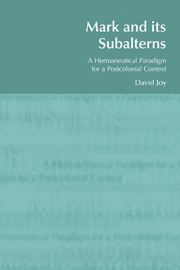Book contents
- Frontmatter
- Contents
- Foreword
- Acknowledgements
- 1 General Introduction
- PART I Hermeneutics: General Methodological Considerations
- PART II Mark – Context and Interpretation
- 4 Colonial Powers and their Marks in Mark
- 5 Mark and its Subalterns: A Product of Conflict and Resistance?
- 6 Mark 10:17–31 in the Light of the Issues of the Poor and their Representation: A Postcolonial Reading
- 7 Mark 7:24–30 in the Light of Race, Gender and Hybridity: A Postcolonial Reading
- 8 Mark 5:1–20 in the Light of the Issues of Class, Nationalism and Subalternity: A Postcolonial Biblical Reading
- 9 General Conclusions: Hermeneutical Issues and Concluding Summary
- Endnotes
- References
5 - Mark and its Subalterns: A Product of Conflict and Resistance?
from PART II - Mark – Context and Interpretation
- Frontmatter
- Contents
- Foreword
- Acknowledgements
- 1 General Introduction
- PART I Hermeneutics: General Methodological Considerations
- PART II Mark – Context and Interpretation
- 4 Colonial Powers and their Marks in Mark
- 5 Mark and its Subalterns: A Product of Conflict and Resistance?
- 6 Mark 10:17–31 in the Light of the Issues of the Poor and their Representation: A Postcolonial Reading
- 7 Mark 7:24–30 in the Light of Race, Gender and Hybridity: A Postcolonial Reading
- 8 Mark 5:1–20 in the Light of the Issues of Class, Nationalism and Subalternity: A Postcolonial Biblical Reading
- 9 General Conclusions: Hermeneutical Issues and Concluding Summary
- Endnotes
- References
Summary
Introduction
In the light of the findings of the previous chapter, which placed the Gospel of Mark in the Roman colonial milieu, this chapter will investigate the sociopolitical, literary and religious origins and dimensions of the Gospel of Mark. By presenting and placing Mark in its real sociopolitical and religiocultural context, it is proposed by this author to offer a hermeneutical challenge based on the rebel and subaltern voices in Mark. Many scholars strongly advocate that Mark had access to some historical and biographical documents which were perhaps shaped immediately after the death of Jesus by the possible eyewitnesses of the ministry of Jesus (Trocme, 1975: 32). This chapter will also study the nature of the Jerusalem authorities and their influence on the Jesus movement. In the same way, on the basis of these investigations it is anticipated that there will be an exploration of the movements of resistance, including the identity and implications of the marginalized and subalterns in the Gospel of Mark.
The Identity of the Author of Mark
A section on the identity of the author of Mark is necessary to understand the sociopolitical and ideological compulsions behind the formation of the Gospel. Despite the existence of many theories about the context and origin of the Gospel, this author would like to place Mark in a “post-Nero/pre-70 Roman setting” (Senior, 1987: 11) as this is ideologically and socially convincing.
- Type
- Chapter
- Information
- Mark and its SubalternsA Hermeneutical Paradigm for a Postcolonial Context, pp. 82 - 123Publisher: Acumen PublishingPrint publication year: 2008

